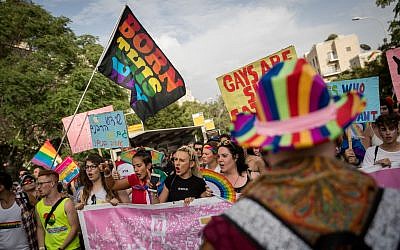Senior Reform and Liberal rabbis have warned that trans Jews are already fearful for their safety in the wake of a landmark Supreme Court decision defining sex and womanhood in legal terms as “biological”.
The judgement, delivered unanimously on Wednesday, clarified that the words “women” and “sex” in the Equality Act 2010 refer to biological sex, not to gender identity or the possession of a Gender Recognition Certificate (GRC).
Campaigners backing the case say it now strengthens the right of single-sex services to exclude trans women, even if legally recognised as female under previous interpretations of the law.
But Jewish clergy have condemned the ruling’s impact on the trans community, calling it a dangerous shift that will increase discrimination and mental health risk.
In a joint statement to Jewish News, Rabbi Anna Wolfson, co-chair of the Conference of Liberal Rabbis and Cantors, and Rabbi Robyn Ashworth-Steen, co-chair of the Assembly of Reform Rabbis and Cantors, said:
Rabbi Anna Wolfson, co-chair of the Conference of Liberal Rabbis and Cantors. Photo Credit: Liberal Judaism
“This ruling is about real people. Trans people are not theoretical case studies. They are our friends, congregants, colleagues and family members.”
They added that rabbis and cantors across the UK were already being contacted by trans members of their communities expressing fear.
“It is vital that our Jewish communities remain safe and inclusive spaces and continue to support our trans and queer members, who will now be at greater risk of discrimination, harm, mental health challenges and suicide,” the statement continued.
“We reject all notions that trans rights are anything other than human rights. This ruling not only affects our transgender members and their families and friends; it impacts all of us.
The court’s decision stems from a challenge brought by Nancy Kelley, the former CEO of Stonewall, and focused on the interpretation of sex in the Equality Act. The legal arguments explored whether “sex” should be understood according to gender identity where a person holds a GRC.
The court concluded that for the purposes of single-sex services and protections under the law, sex must be interpreted as biological.
The ruling will now apply to settings such as women’s refuges, hospital wards, changing rooms, rape crisis centres, and sporting categories.

Members and sympathizers of the LGBTI (lesbian, gay, bisexual, transgender, and intersex) community participate in the annual Gay Pride parade in Jerusalem, 2019. Photo by: JINIPIX
Writing in its conclusion, the court stated, “Read fairly and in context, the provisions relating to single-sex services can only be interpreted by reference to biological sex… It is fanciful (even perverse) to think that any reasonable objection to the presence of a person of the opposite sex could be grounded in GRC status.”
Campaign groups including the LGB Alliance and Sex Matters hailed the judgement as a major victory for what they called “common sense” and the rights of same-sex attracted individuals.
Kate Barker, CEO of the LGB Alliance, claimed it marked “a watershed for women”, especially lesbians, saying, “The ruling confirms that the words ‘gay’ and ‘lesbian’ refer to same-sex sexual orientation and makes it absolutely clear that lesbians wishing to form associations of any size are lawfully entitled to exclude men – whether or not they possess a GRC.”
Kemi Badenoch, Conservative equalities minister and party leader, celebrated the decision as a vindication for women who had “faced personal abuse or lost their jobs for stating the obvious”. She said, “Women are women and men are men: you cannot change your biological sex.”

Kemi Badenoch
Meanwhile, former SNP MP Joanna Cherry said politicians must now ensure that public institutions act in line with the clarified law, stating, “There will have to be a sea-change across the public sector to recognise the law has been clarified in the ruling.”